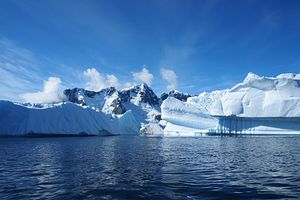On February 7, 2018, during China’s 34th Antarctic Expedition, Chinese researchers laid the foundation of China’s fifth Antarctic research station on Inexpressible Island in Terra Nova Bay of the Ross Sea. It is expected that construction will be completed in 2022. China’s fifth station is designed to be a year-round research base, which could accommodate 80 people in the summer and 30 people in winter.
Subsequently, in May 2018 in Buenos Aires, China officially presented its proposal on the construction and operation of a new research station to the 41st Antarctic Treaty Consultative Meeting and the 21st Committee for Environmental Protection Meeting – the decision-making body for Antarctic governance.
China already has four Antarctic stations – Great Wall (established in 1985, on King George Island), Zhongshan (1989, on Larsemann Hill), Kunlun (2009, on Dome A, near the center of East Antarctica), and Taishan (2014, on Princess Elizabeth Land). Why does China want to build a fifth research station in Antarctica? Once built, what would be its implications for future Antarctic governance?
Why China Is Building a Fifth Research Station
During his visit to Hobart, Australia in 2014, Chinese President Xi Jinping outlined for the first time a strategy to “understand, protect, and use” the Antarctic. “Understand, protect, and use” have since emerged as guiding principles for Chinese polar activities. China’s White Paper on Antarctic Activities was published in May 2017 by the State Oceanic Administration (now part of the Ministry of Natural Resources) during the 40th Antarctic Treaty Consultative Meeting hosted by China’s Ministry of Foreign Affairs in Beijing. In the White Paper, China describes Antarctica as “a new space of global environment and resources that is of great significance to the process of human development.” The White Paper reiterates the principles of “understand, protect, and use.” Similarly, the Chinese Government published its first ever Arctic Policy White Paper in January 2018. The policy states that “China’s policy goals on the Arctic are: to understand, protect, develop and participate in the governance of the Arctic.”
In order to better understand Antarctica, the Chinese government has committed to further invest in Antarctic science. In its 13th Five-Year Plan of National Economic and Social Development (2016-2020), the Chinese government declared that investments in polar research will be significantly increased through the Xue Long Tan Ji Project. Indeed, building the fifth Antarctic Station is part of the Xue Long Tan Ji Project, as are a number of new initiatives, e.g., deployment of the new icebreaker Snow Dragon 2, and improvement of Antarctic aviation capacity for logistics, including testing polar fixed-wing aircraft “Snow Eagle 601.”
Dr. Yang Huigen, director of the Polar Research Institute of China, explains that the establishment of the fifth Antarctic research station will “fill in the gap of conducting scientific research in the Ross Sea and definitely enhance China’s capacity in understanding Antarctica.”
Apart from scientific reasons, there are strategic interests for China to build a research station in the Ross Sea area. The Ross Ice Shelf is the largest ice shelf of Antarctica. The Antarctic and Southern Ocean Coalition has highlighted that “the Ross Sea has the richest diversity of fishes in the high latitude Southern Ocean.” The Sea provides habitat for significant populations of faunal species. This includes 38 percent of the world’s Adélie penguins, 26 percent of emperor penguins, more than 30 percent of Antarctic petrels and 6 percent of Antarctic minke whales.
In recognition of the area’s importance, the Ross Sea Marine Protected Area (MPA) – the world’s largest MPA — was established in 2017. China opposed the proposal for a Ross Sea MPA in the Commission for the Conservation of Antarctic Marine Living Resources for years. China finally accepted the revised U.S.-New Zealand proposed MPA that would last 35 years.
The establishment of China’s fifth Antarctic station in a key area for Antarctic governance, not far from the world’s largest Antarctic station — McMurdo Station of the United States — as well as New Zealand’s Scott Base, would greatly help China’s ambitions to become a serious player in Antarctic governance.
Implications
What are the implications for Antarctic governance then, once China’s fifth Antarctic station is completed in 2022? With a better understanding of Antarctica, China wants to maximize its national interests – the protection and peaceful use of Antarctica, through shaping Antarctic governance regimes.
In recent years, China has participated actively in multilevel governance of the polar regions. For example, China was invited as one of five key high sea fishing States to negotiate the Agreement to Prevent Unregulated High Seas Fisheries in the Central Arctic Ocean. Nevertheless, unlike the Arctic, where China has already published a clear policy paper, China has yet to adopt an official Antarctic policy. The “China’s Antarctic Activities” White Paper can be seen as a work-in-progress policy document that aims to communicate to the rest of the world what China has been doing in the Antarctic so far. China still needs an official Antarctic policy, which will guide China’s actions in a turbulent time of global governance. Therefore, the next few years, while China is constructing its fifth Antarctic station, could be a vital period of time for the maturation of China’s Antarctic policy.
China is enhancing its scientific and diplomatic capacity, as well as closely watching the call for the reform of Antarctic Treaty in a shifting geopolitical environment. We may expect China to publish an official Antarctic policy upon the completion of the fifth Antarctic station. At that time, China might become a player that is skillful in presenting solid and concrete proposals to drive Antarctic governance according to its interests.
Nengye Liu is a senior lecturer at Adelaide Law School, University of Adelaide, Australia.

































